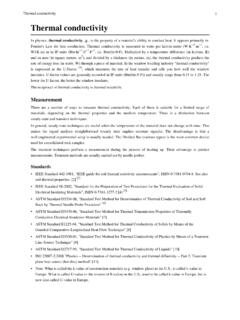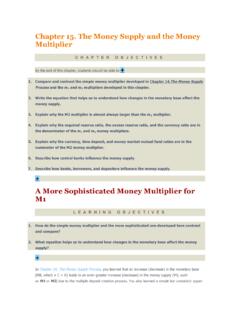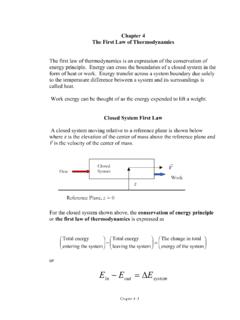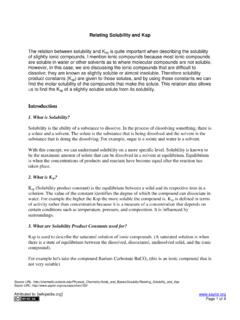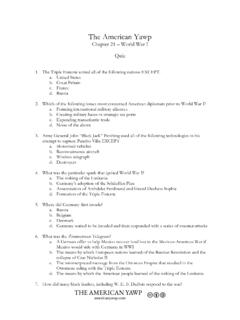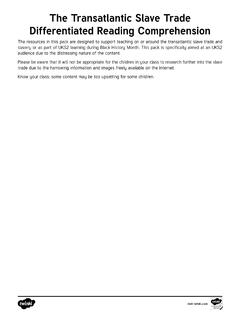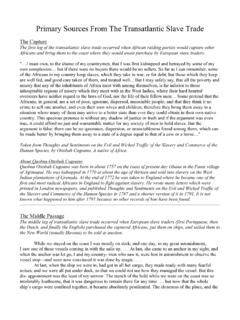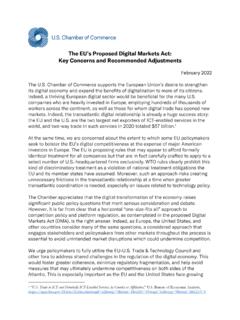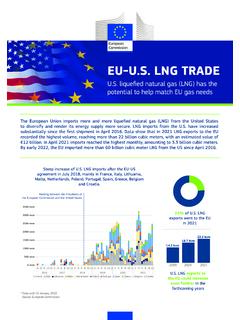Transcription of The European Voyages of Exploration: Introduction
1 Saylor Saylor of3 The European Voyages of Exploration: IntroductionBeginning in the early fifteenth century, European states began to embark on aseries of global explorations that inaugurated a new chapter in world history. Known asthe Age of Discovery, or the Age of Exploration, this period spanned the fifteenththrough the early seventeenth century, during which time European expansion to placessuch as the Americas, Africa, and the Far East flourished. This era is defined by figuressuch as Ferdinand Magellan, whose 1519 1522 expedition was the first to traverse theAtlantic to the Pacific Ocean and the first to circumnavigate the European Age of Exploration developed alongside the Renaissance.
2 Bothperiods in Western history acted as transitional moments between the Middle Ages andthe early modern period. Competition between burgeoning European empires, such asSpain and England, fueled the evolution and advancement of overseas by religion, profit, and power, the size and influence of European empiresduring this period expanded greatly. The effects of exploration were not only felt abroadbut also within the geographic confines of Europe itself. The economic, political, andcultural effects of Europe s beginning stages of global exploration impacted the long-term development of both European society and the entire and PoliticsDuring the eighth century, the Islamic conquest of North Africa, Spain, France,and parts of the Mediterranean, effectively impeded European travel to the Far East forsubsequent centuries.
3 This led many early explorers, such as Vasco de Gama andChristopher Columbus, to search for new trade routes to the East. Previous travelaccounts from the early expeditions of figures such as Marco Polo (during the latethirteenth century) encouraged many Europeans to search for new territories and placesthat would lead to the East. Ocean Voyages were extremely treacherous during thebeginnings of European exploration. The navigation techniques were primitive, themaps were notoriously unreliable, and the weather was unpredictable. Additionally,explorers worried about running out of supplies, rebellion on the high seas, and hostileindigenous Spanish and Portuguese were some of thefirst European states to launchoverseas Voyages of exploration.
4 There were several factors that led to the Iberianplace in the forefront of global exploration. The first involved its strategic geographiclocation, which provided easy access to venturing south toward Africa or west towardthe Americas. The other, arguably more important, factor for Spain and Portugal sleading position in overseas exploration was these countries acquisition and applicationof ancient Arabic knowledge and expertise in math, astronomy, and principal political actors throughout the Age of Exploration were Spain,Portugal, The Netherlands, England, and France. Certain European states, primarilyPortugal and The Netherlands, were primarily interested in building empires based onglobal trade and commerce.
5 These states established worldwide trading posts and thenecessary components for developing a successful economic infrastructure. OtherEuropean powers, Spain and England in particular, decided to conquerand colonize theSaylor Saylor of3new territories they discovered. This was particularly evident in North and SouthAmerica, where these two powers built extensive political, religious, and FactorsBefore the fifteenth century, Europeanstates enjoyed a long history of trade withplaces in the Far East, such as India and China. This trade introduced luxury goodssuch as cotton, silk, and spices to the European economy. New technologicaladvancements in maritime navigation and ship construction allowed Europeans to travelfarther and explore parts of the globe that were previously unknown.
6 This, in turn,provided Europeans with an opportunity to locate luxury goods, which were in highdemand, thereby eliminating Europe s dependency on Eastern trade . In many ways,the demand for goods such as sugar, cotton, and rum fueled the expansion of Europeanempires and their eventual use of slave labor from Africa. Europe s demand for luxurygoods greatly influenced the course of the transatlantic slave the fifteenth and sixteenth centuries small groups financed by privatebusinesses carried out the first phase of European exploration. Members of the nobleor merchant class typically funded these early expeditions. Over time, as it becameclear that global exploration was extremely profitable, European states took on aprimary role.
7 The next phase of exploration involved Voyages taken in the name of aparticular empire and monarch ( , France or Spain). The Iberian empires of Spainand Portugal were some of the earliest states to embark on new Voyages of addition to seeking luxury goods, the Spanish empire was driven by its quest forAmerican and CultureThe period of European exploration introduced the people of Europe to theexistence of new cultures worldwide. Before the fifteenth century, Europeans hadminimal knowledge of the people and places beyond the boundaries of Europe,particularly Africa and Asia. Before the discovery of the Americas, Europeans did noteven know of itsexistence. Europeans presumed that the world was much smaller thanit was in actuality.
8 This led early explorers such as Columbus and Magellan to believethat finding new routes to the Far East would be much easier than it turned out to misconceptions about geography and the cultures of local populationswould change very slowly throughout the early centuries of European exploration. Bythe sixteenth century, European maps started to expand theirdepictions andrepresentations to include new geographic discoveries. However, due to the intensepolitical rivalries during the period, European states guarded their geographicknowledge and findings from one the growth of the printing press during the sixteenth century, accounts ofoverseas travels, such as those of Marco Polo in the late thirteenth century, spread to awider audience of European readers than had previously been possible.
9 The Age ofExploration also coincided with the development of Humanism and a growingSaylor Saylor of3intellectual curiosity about the natural world. The collection and study of exoticmaterials such as plants and animals led to a new age of scientific exploration andinquiry. These initial surveys and analyses influenced future revolutionarydevelopments in numerous fields of science and natural history in the late seventeenthand eighteenth FactorsOne of the tenets of Catholicism decreed that Christianity ought to be theuniversal religion and faith among all mankind. The Crusades in the centuriespreceding the Age of Exploration exposed Europeans to new places, people, andgoods. It also reflected the zealous nature of medieval Christianity and foreshadowedthe fervent missionary work that would form a major part of all early global pope played an important and validating role in these Voyages by sanctioning andencouraging worldwide exploration.
10 This often included the approbation of enslavingAfricans and indigenous peoples. Missionaries were frequently a part of the earlyexpeditions of Spain with the aim of bringing Christianity to the native typically viewed indigenous populations as barbaric heathens who couldonly become civilized through the adoption of : The age of European exploration and discovery represented a new period ofglobal interaction and interconnectivity. As a result of technologicaladvancements, Europeans were able toforge into new and previouslyundiscovered territories. They understood this to be a New World. European exploration was driven by multiple factors, including economic,political, and religious incentives.


